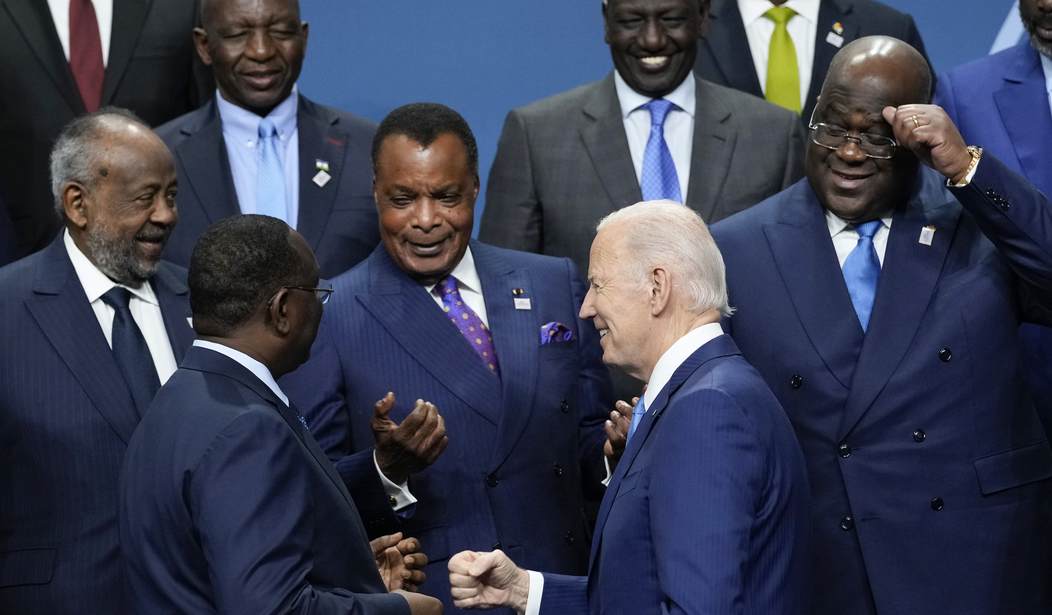Since freeing themselves from European colonialism in the mid-20th century, many African nations have struggled to develop stable democracies. Where democracies were expected to thrive, anarchy has often flourished, and the absence of governance has bred unique opportunities for criminal enterprises, genocide, brutal dictatorships, and terrorism on the continent.
Regrettably, the United States, Europe, and the United Nations continue to be more of a problem than a solution. Before being freed from prison and uniting the people of South Africa, the U.S. Department of State joined Britain in officially designating Nelson Mandela as a terrorist. The Obama Administration stood firm behind Mohamed Morsi and his Muslim Brotherhood while the streets of Cairo ran red with blood. That Donald Trump’s foreign policy commitments did not include Africa at all only added to a general lack of engagement in African affairs.
Last December, President Joe Biden hosted the U.S.-Africa Leaders Summit. Though it was a step in the right direction, several decisions rendered the summit less effective than it could have been.
First, Biden and his entourage should have gone to Africa and not expected fifty prime ministers and presidents to come to him. Second, Biden’s appointment of former Assistant Secretary of State Johnnie Carson as the point man for follow-up meant the installation of a U.S. official who may have spent less time on the African continent than Kamala Harris has spent in the southwestern states fulfilling her role as "Border Czar."
Encouraging it was not.
The State Department generally prefers to work through their embassies and envoys when dealing with foreign countries. By contrast, the Department of Defense operates in foreign countries with engagement limited to their bases. When the two agencies work together, it’s often a mess.
Recommended
This is the scenario playing out all over Africa. While the State Department focuses on its in-country embassies and limited-scope missions, the only U.S. military facility operating on the continent is Camp Lemonnier. Located in the east-coast country of Djibouti, the camp’s primary missions are directed toward the Middle East and ensuring safe passage for ships traveling the Red Sea enroute to, and coming from, the Suez Canal to the northeast. Aside from emergency response to human and natural-caused emergencies and disasters, for which food stocks are available on the base, very little is happening at Camp Lemonnier that pertains to Africa.
Despite its size, Djibouti is the only stable country in the Horn of Africa region. Counterclockwise from the northeast, its neighbors are Eritrea, Ethiopia, Somalia, and Yemen across the Gulf of Aden. To suggest the neighborhood presents challenges would be an understatement. If not for Djibouti, shipping access to one of the world’s most critical seaways would be jeopardized – as evidenced in past years by Somali pirates.
Djibouti’s President, Ismail Omar Guelleh, has engaged in multiple peace missions both within Africa and with nations around the globe. France, Italy, Japan, and China also have overseas military bases in the country. From its base, which it established in 2017, China is leveraging Djibouti as its Belt-and-Road Initiative entry point into Africa. Having modernized the Port of Doraleh to handle large cargo ships, China is today sending and receiving trade goods into Africa on its ever-lengthening electric railway system.
Throughout Africa, Beijing is introducing aid, investments, and loans equating to $60 billion. Nations that have accepted these loans and investments are realizing financial indebtedness to the People’s Republic and quickly losing control of their countries. What many are now experiencing and will need to deal with even more in the future is a 21st century form of colonial expansion – this time by an Asian hegemon and not a Western power. Because of the depression and instability throughout the continent, as well as corrupt political leaders, many African countries will be subjected to further exploitation unless Western authorities take measures to balance China’s rising presence on the continent.
Djibouti is in prime position to be a platform from which to project U.S. power if President Biden and Ambassador Carson simply decide what it is they wish to do in support of Africa’s development. The leadership breakout session at the U.S.-Africa Leaders Summit included discussions relating to good governance, democracy, human rights, justice, the rule of law, peace and security, and African prosperity based on inclusive growth and sustainable development.
The fact that fifty prime ministers and presidents from Africa came to Washington to participate in a joint summit proves that they are willing to work with the United States. A U.S. military installation at Camp Lemonnier is already firmly established in Djibouti, as is an American embassy. The stage is set for the positioning of a joint department task force that can serve as a prototype for assisting the development of other African nations. This singular action could aid the continent in its efforts to reject Beijing’s pernicious influence.
With China on the move, Djibouti is ready to assist. Is America ready to act?
Prof. Ivan Sascha Sheehan is the associate dean of the College of Public Affairs and past executive director of the School of Public and International Affairs at the University of Baltimore.

























Join the conversation as a VIP Member